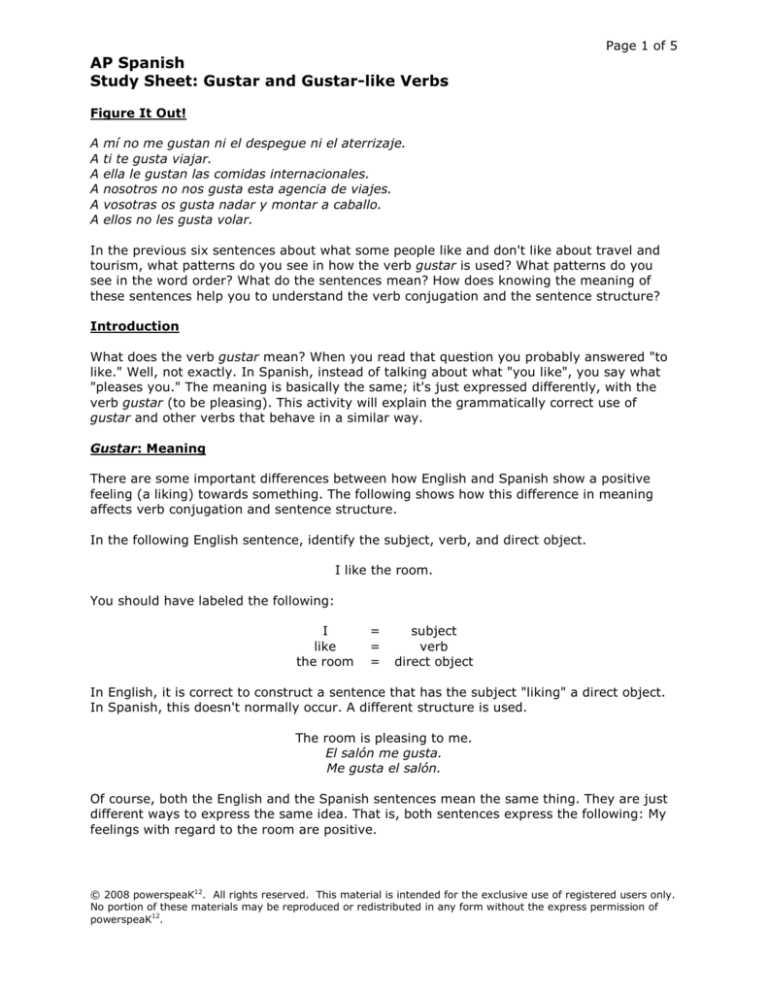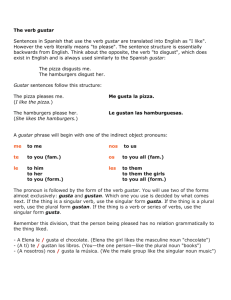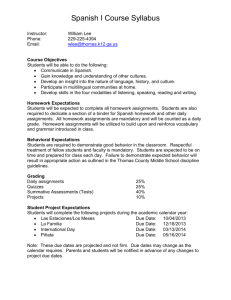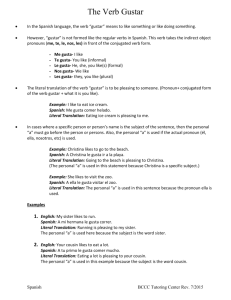
Page 1 of 5
AP Spanish
Study Sheet: Gustar and Gustar-like Verbs
Figure It Out!
A
A
A
A
A
A
mí no me gustan ni el despegue ni el aterrizaje.
ti te gusta viajar.
ella le gustan las comidas internacionales.
nosotros no nos gusta esta agencia de viajes.
vosotras os gusta nadar y montar a caballo.
ellos no les gusta volar.
In the previous six sentences about what some people like and don't like about travel and
tourism, what patterns do you see in how the verb gustar is used? What patterns do you
see in the word order? What do the sentences mean? How does knowing the meaning of
these sentences help you to understand the verb conjugation and the sentence structure?
Introduction
What does the verb gustar mean? When you read that question you probably answered "to
like." Well, not exactly. In Spanish, instead of talking about what "you like", you say what
"pleases you." The meaning is basically the same; it's just expressed differently, with the
verb gustar (to be pleasing). This activity will explain the grammatically correct use of
gustar and other verbs that behave in a similar way.
Gustar: Meaning
There are some important differences between how English and Spanish show a positive
feeling (a liking) towards something. The following shows how this difference in meaning
affects verb conjugation and sentence structure.
In the following English sentence, identify the subject, verb, and direct object.
I like the room.
You should have labeled the following:
I
like
the room
=
=
=
subject
verb
direct object
In English, it is correct to construct a sentence that has the subject "liking" a direct object.
In Spanish, this doesn't normally occur. A different structure is used.
The room is pleasing to me.
El salón me gusta.
Me gusta el salón.
Of course, both the English and the Spanish sentences mean the same thing. They are just
different ways to express the same idea. That is, both sentences express the following: My
feelings with regard to the room are positive.
© 2008 powerspeaK12. All rights reserved. This material is intended for the exclusive use of registered users only.
No portion of these materials may be reproduced or redistributed in any form without the express permission of
powerspeaK12.
Page 2 of 5
AP Spanish
Study Sheet: Gustar and Gustar-like Verbs
Gustar: Sentence Structure
When you talk about liking something in Spanish, the thing that is pleasing (the thing that
you like) becomes the subject, and the person that it's pleasing to (the "liker") becomes the
indirect object. Not only that: the normal word order changes so that subject comes after
gustar. Look at the following sentence:
Me gusta la habitación.
In English, we would say "I like the room." So why isn't the verb gusto instead of gusta? It's
because "I" am not the subject anymore! "I" have been turned into an object (the word me,
at the beginning of the sentence)! Remember that gustar will always be conjugated to agree
with the subject from the Spanish point of view (la habitación = the room) and not from
the English point of view (I).
What if you wanted to change "room" to "rooms" in the translation? You just use the 3rd
person plural conjugation of the verb gustar. So, the new sentence would be as follows:
Me gustan las habitaciones.
So conjugating the verb gustar is very simple. It becomes either gusta or gustan, depending
upon whether the thing that is liked (remember: that's the subject) is singular or plural.
And in Spanish, that subject will almost always follow the verb gustar. So, just keep the
following two rules in mind when conjugating the verb gustar:
If the subject (the thing you or someone else likes) is singular Use gusta.
If the subject is plural Use gustan.
But what about the person doing the "liking?" That is, what happens to the "I" in "I like the
rooms" when expressing this concept in Spanish? As mentioned earlier, the subject in the
English sentence becomes an indirect object in the Spanish sentence. The indirect object in
Spanish shows who is being pleased by the subject. The following table shows the Spanish
indirect objects and their English equivalents.
SPANISH
INDIRECT OBJECT PRONOUNS
me
nos
te
os
le
les
ENGLISH
INDIRECT OBJECT PRONOUNS
(to) me
(to) us
(to) you
(to) you [plural]
(to) him
(to) them
(to) her
(to) you [formal, plural]
(to) you [formal]
© 2008 powerspeaK12. All rights reserved. This material is intended for the exclusive use of registered users only.
No portion of these materials may be reproduced or redistributed in any form without the express permission of
powerspeaK12.
Page 3 of 5
AP Spanish
Study Sheet: Gustar and Gustar-like Verbs
Here are some examples of the correct use of gustar with the accompanying Spanish
indirect object pronoun. Notice that the only forms of gustar that appear are gusta and
gustan, even though a lot of different people "like" the things mentioned.
Me gusta la habitación.
Me gustan las habitaciones.
Nos gusta la habitación.
Nos gustan las habitaciones.
Te gusta la habitación.
Te gustan las habitaciones.
Os gusta la habitación.
Os gustan las habitaciones.
Le gusta la habitación.
Le gustan las habitaciones.
Les gusta la habitación.
Les gustan las habitaciones.
But let's take a closer look at the 3rd person pronouns. For example, what do the following
sentences mean?
Le gusta la habitación.
Les gusta la habitación.
It's impossible to tell exactly what they mean. They could mean one of several things.
He likes the room.
She likes the room.
You (formal) like the room.
They (masculine) like the
room.
They (feminine) like the
room.
You (plural) like the room.
For purposes of clarification, the sentence will often begin with a phrase that clarifies just
who the indirect object pronoun refers to. In other instances, where it is clear who the
pronoun refers to, a phrase can be used for emphasis or to contrast what one person likes
or dislikes with what another person likes or dislikes. The following table shows some
examples of these prepositional phrases.
PREPOSITIONAL PHRASES
a mí
a ti
a él (a Juan, a Roberta, a Pedro, etc.)
a élla (a María, a Luz, a Lupe, etc.)
a usted
a nosotros
a nosotras
a vosotros
a vosotras
a ellos (a los estudiantes, etc.)
a ellas (a las bailarinas, etc.)
a ustedes
Note that these prepositional phases all begin with the preposition a. Also note that the 1st
person singular prepositional pronoun mí has an accent to distinguish it from the possessive
adjective mi meaning "my." And while you're at it, observe that ti doesn't have an accent. It
never does!
© 2008 powerspeaK12. All rights reserved. This material is intended for the exclusive use of registered users only.
No portion of these materials may be reproduced or redistributed in any form without the express permission of
powerspeaK12.
Page 4 of 5
AP Spanish
Study Sheet: Gustar and Gustar-like Verbs
Gustar: Summary
In this activity so far, we've explained how to express a positive feeling (a "liking") towards
something in Spanish. Let's review some of the main points. For example, how do you say
"I like the rooms" in Spanish?
(OPTIONAL PREPOSITIONAL PHRASE)
PREPOSITIONAL
PREPOSITION A
PRONOUN
(A
mí)
INDIRECT
OBJECT
PRONOUN
VERB
SUBJECT
me
gustan
las habitaciones.
Keep in mind the following when using the verb gustar:
• The subject (what you or someone "likes") almost always comes after the verb.
• The verb gustar is conjugated in agreement with the subject that follows it. That
subject is the thing that is "liked." It is normally in the 3rd person singular (gusta) or
plural (gustan) forms only.
• The indirect object pronoun precedes the verb and is the person that is "doing the
liking" (from an English point of view). In other words, it is the person that is pleased
by the subject.
• A phrase beginning with a and followed by a pronoun or noun can be used to clarify
who "likes" the thing in question, or to add emphasis. They are optional.
• Always use the 3rd person singular form of gustar (gusta), followed by an infinitive
verb, to say that someone likes doing something. Never use the gerund (-ando or
–iendo) form:
Me gusta cantar.
•
BUT NEVER: Me gusta cantando.
To make a negative statement, the word no precedes the indirect object, but follows
the prepositional phrase if present.
Gustar-Like Verbs
Now that you know how to correctly use the verb gustar, the following table lists some
common verbs that work the same way. That is, the subject follows the verb, and an
indirect object pronoun is required before the verb. A prepositional phrase is optional for
clarifying or for emphasizing the indirect object pronoun.
© 2008 powerspeaK12. All rights reserved. This material is intended for the exclusive use of registered users only.
No portion of these materials may be reproduced or redistributed in any form without the express permission of
powerspeaK12.
Page 5 of 5
AP Spanish
Study Sheet: Gustar and Gustar-like Verbs
SPANISH INFINITIVE
ENGLISH EQUIVALENT
SPANISH INFINITIVE
aburrir
agradar
to bore
to be pleasing to
importar
indignar
bastar
caer bien (mal)
dar asco
disgustar
doler (o,ue)
encantar
enojar
to be sufficient
to (not) suit
to be loathsome
to hate something
to be painful
to "love" something
to anger
interesar
molestar
ofender
parecer
picar
preocupar
quedar
faltar
to be lacking
something
to be fascinating to
sorprender
ENGLISH
EQUIVALENT
to be important to
to make one
indignant
to be interesting to
to be a bother
to offend, to wrong
to appear to be
to prick, to sting
to worry
to be left over, to
fit, to look good on
to surprise
tocar
volver (o,ue) loco
to be one's turn
to drive crazy
fascinar
Here are some example sentences using gustar-like verbs:
(A mí) me ofenden sus palabras.
Her words offend me.
(A nosotros) nos aburre ese deporte.
(That sport is boring to us.)
(A ti) no te quedan bien esos zapatos.
(Those shoes don't fit you.)
(A vosotras) os encantan las películas
románticas.
You (women or girls) love romantic movies.
(A mi hermana) le basta dormir sólo cinco
horas.
(My sister can get by on five hours of sleep.)
(A mis amigos) les agrada nadar y jugar al
golf.
My friends enjoy swimming and playing golf.
© 2008 powerspeaK12. All rights reserved. This material is intended for the exclusive use of registered users only.
No portion of these materials may be reproduced or redistributed in any form without the express permission of
powerspeaK12.










